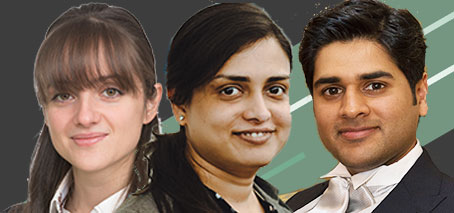- First recipients of FLEET ECR Grants
- Grants funding research trips to Italy, Singapore, US

Dr Priyank Kumar (UNSW)
FLEET’s ECR Grants fund travel for ECRs and PhDs, developing networks and professional and scientific skills, including supporting travel to research facilities to learn new techniques, form new collaborations, or complete training.
Of the 1st round’s eight applications, the Education & Training Committee decided to fund three:
- Priyank Kumar (UNSW) will be travelling to the University of Rome Tor Vergata to investigate excitonic insulators using ab initiocomputations, working with Prof Maurizia Palummo. Priyank aims to discover two-dimensional transition metal dichalcogenides-based excitonic insulators and explore ways to further engineer this phase, building skills in state-of-the-art many body perturbation theory approaches to increase his potential research areas.
-

Dr Iolanda di Bernardo (Monash)
Iolanda Di Bernardo (Monash) will be examining novel electronic material via a combination of microscopy and spectroscopy techniques, building and strengthening partnerships with researchers at Nanyang Technological University (Singapore). She will create new collaborations with FLEET members and partners at NTU, expanding her own collaboration network and honing skills in a lab with prior experimental knowledge on a similar project, placing her in the best environment for success with this project at FLEET.
- Semonti Bhattacharyya (Monash) will travel to Penn State University to work with experts on molecular beam epitaxy growth and electrical transport of topological insulators, devices and valleytronic measurements. Semonti’s project aims to create a large-area topological-effect transistor through fabrication of defect-free interfaces of topological insulators and ferromagmetic insulators. Her well-thought-out application clearly laid out the benefits to both herself and FLEET.

Dr Semonti Bhattacharyya (Monash)
Each recipient receives $5,000 to work on their proposed idea. We are hoping that these projects will lead to new ideas, skills and collaborations that will benefit both the ECRs and FLEET. We are looking forward to hearing about their travels when they return.
Grant applications were assessed by FLEET’s Education & Training Committee, comprising: Jared Cole, Chair (RMIT), Matthew Davis (UQ), Oliver Stockdale (UQ), Maciej Pieczarka (ANU), Jeff Davis (Swinburne), Kris Helmerson (Monash), Dianne Ruka (Monash), Hareem Khan (RMIT), Jan Seidel (UNSW), and Xiaolin Wang (UoW).
Oliver Stockdale, PhD student from UQ, who has been on the Education & Training committee for a few months, commented on how much he learnt from the process of debating grant applications, in particular noting which aspects stood out for the committee.

Oliver Stockdale (UQ)
“Listening to the more experienced members of the committee discuss the applications gave me a keen insight into what is important about grant writing, and will surely assist me in my future applications. I’d strongly encourage other FLEET students to join a committee as they often provide (sometimes unexpected!) very useful tools for professional development outside of research.”
FLEET members: Could the ECR Grant fit your own development needs? Good news: a second round of applications will be invited later in 2020. Applications must clearly explain what the new skill or opportunity means for the applicant, focusing on a new collaboration or opportunity – not travel already funded by CIs.
All applicants receive feedback on their proposal (and those who are successful get to add one funded grant to their CVs!)

